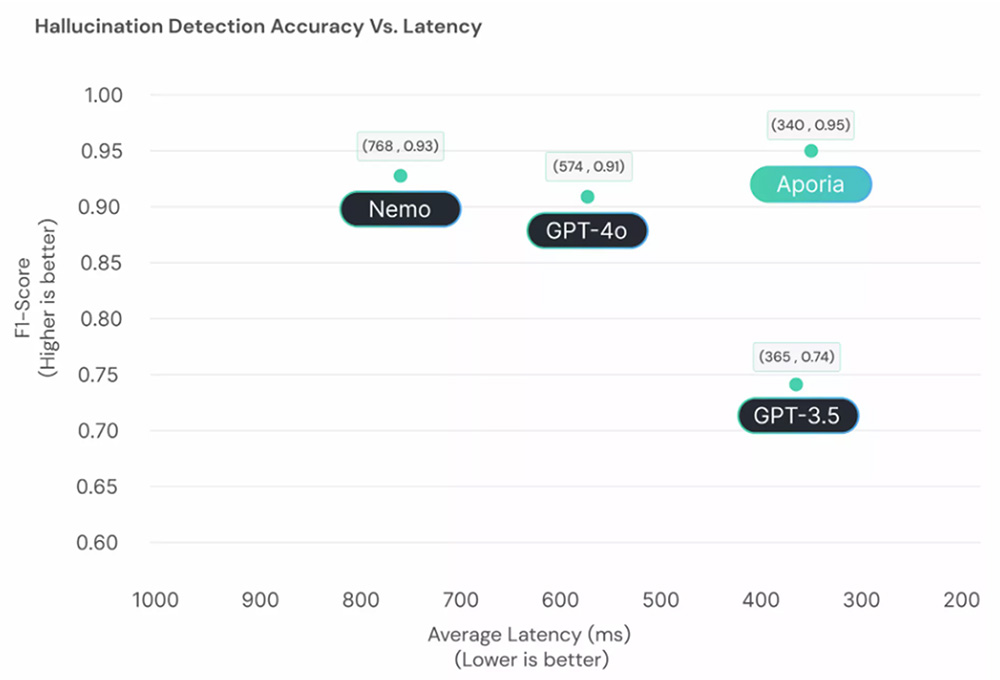Aporia, an AI control platform, has recently unveiled 2024 benchmark results proving its Guardrails system’s superior performance compared to industry giants like NeMo and GPT-4. This marks a breakthrough in the quest for trustworthy AI applications.
The implications of Aporia’s achievement show more than technical superiority. As AI systems become increasingly integrated into business operations and everyday life, the need for robust safeguards against errors and misuse has never been more pressing. Aporia’s Guardrails offers a compelling and top-notch solution to these challenges.
Accuracy in Hallucination Detection
Aporia’s system has demonstrated an impressive detection rate for hallucinations, which addresses one of the most persistent issues in AI deployment: language models’ tendency to generate false or misleading information.
It achieves this feat through its unique in-house infrastructure, which trains various specialized small language models. The MultiSLM (Multiple Specialized Language Models) architecture achieves remarkably low latency, with an average response time of just 0.34 seconds.
Conversational AI and voice-based applications need such speed to maintain improved user experiences, as even slight delays can disrupt the natural flow of interaction.
Notably, the MultiSLM method delivers speed while maintaining high accuracy. Aporia’s system can process complex queries more efficiently by distributing tasks across multiple specialized models rather than relying on a single large language model. This architecture enhances the system’s robustness, as issues with one model do not compromise the entire system’s functionality.
With this perk, businesses can enjoy peace of mind knowing they have reliable AI applications that can handle high-volume interactions without sacrificing quality or responsiveness.
Real-Time Mitigation
Aporia’s system offers more than detection. It also prides itself on real-time mitigation of hallucinations before they reach end-users. This capability represents a feat in AI safety, allowing for the deployment of AI-powered applications in time-sensitive and high-stakes environments. The ability to intercept and correct errors in real time minimizes the risk of harmful outcomes and maintains the integrity of AI-human interactions.
This real-time mitigation feature is also precious in customer service chatbots, where immediate, accurate responses are critical. It also opens up new possibilities for AI use in emergency response systems or financial trading platforms, where split-second decisions can have significant consequences.
Versatility Across Industries
Without question, Aporia’s Guardrails system shows remarkable adaptability across various sectors. In manufacturing, it can monitor AI systems controlling production lines, preventing costly errors, and maintaining safety standards.
The healthcare industry benefits from its ability to safeguard patient data confidentiality while allowing AI to assist in diagnosis and treatment planning. Meanwhile, financial institutions can confidently deploy AI-powered advisory services, knowing that Aporia’s Guardrails will help prevent the dissemination of inaccurate financial information.
The system’s flexibility also extends to customization options, enabling businesses to tailor it to their needs and regulatory requirements. This adaptability is essential for companies in industries that need to maintain stringent compliance standards, such as legal services or government operations.
AI Reliability and Trust Should Be Prioritized
Aporia’s track record of consistently outperforming established players like GPT-4 and NeMo changes expectations for AI reliability. This achievement carries implications for the broader adoption of AI technologies. As businesses and consumers grow more aware of the potential risks associated with AI, solutions that can improve safety and trustworthiness become increasingly valuable.
Aporia’s success in this space makes way for more widespread integration of AI into critical systems and decision-making processes. It addresses many organizations’ hesitation about relying on AI for sensitive tasks, offering a safeguard against errors and misuse.
This increased trust could accelerate AI adoption across industries, unlocking new levels of efficiency while mitigating associated risks. With solutions like Aporia’s Guardrails, the future of AI looks powerful, secure, and reliable.






